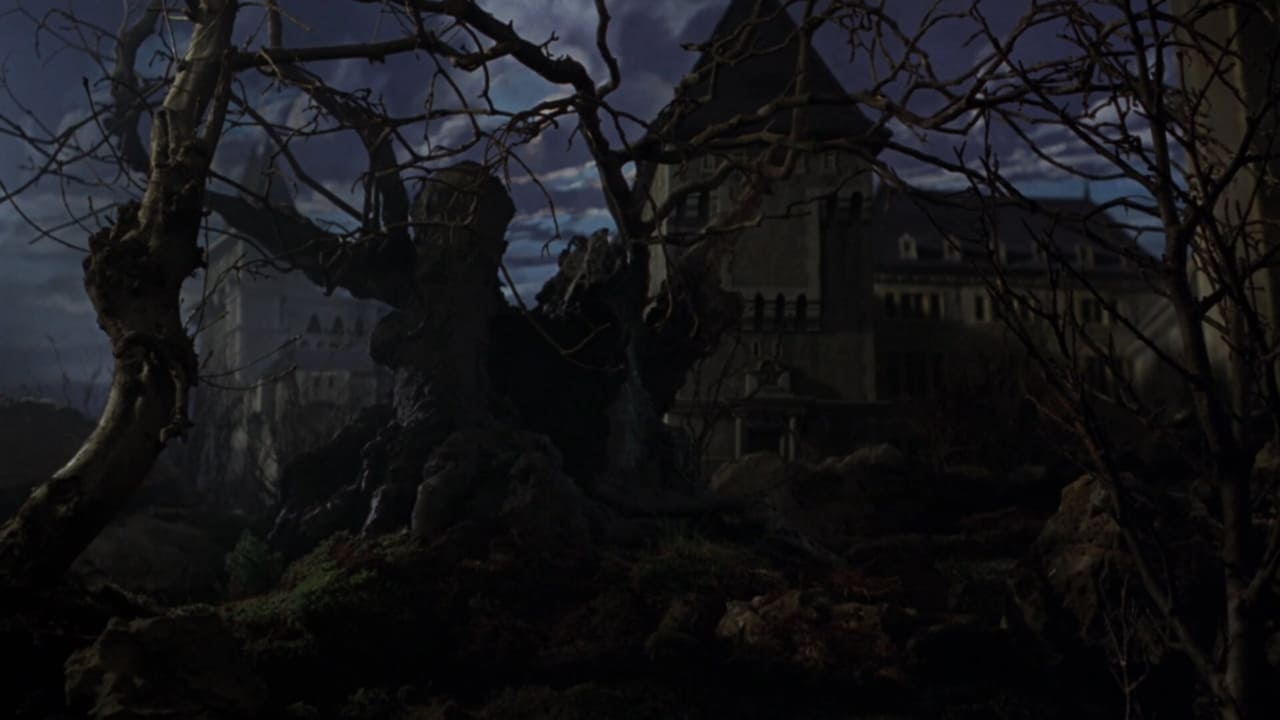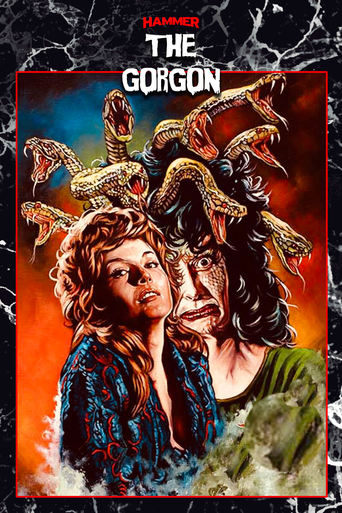

Plot so thin, it passes unnoticed.
... View MoreBetter Late Then Never
... View MoreAm I Missing Something?
... View MoreIt's fun, it's light, [but] it has a hard time when its tries to get heavy.
... View MoreFrom the opening credits, this could only ever be a Hammer film. James Bernard's trademark scores, a matte paining of a castle in the distance (which makes a very effective screensaver), a young girl in distress and Peter Cushing tinkering in an ornate laboratory: formulaic such an intro may be, but it produces an instant warm glow in retrospect – which is probably the polar opposite of the effect hoped for back in 1964.Wheeling in a fresh corpse, Nurse Hoffman (Barbara Shelley) is somewhat alarmed when the hand that falls from the stretcher breaks in half, as if it is made of stone. Pretty soon, the dead girl's bohemian fiancé has hung himself, revealed in close-up. The warm glow becomes distinctly frosty.So too, are the characters we meet in this production. On seeing the Medusa, or more specifically her glare, characters become aged. That is, they appear to be sprinkled with talcum powder in a cheap looking effect that is never convincing. Christopher Lee's Professor Karl Meister comes already doused in talc, to lend maturity to such a man of learning, pompous and aloof. Even the avuncular Cushing is starchy in this. Only Richard Pasco succeeds in injecting some naturalism into his role, the almost-hero Paul Heitz. We cry out for a Michael Ripper or a Miles Malleson cameo to lighten up the mood.Whilst professional and polished, the production is somewhat perfunctory, and there is a damning coolness to the sporadic 'scares' – whereas in reality, only the finale, with Barbara Shelley's transformation into the deadly Megaera, succeeds in providing any shivers, and the less than stellar realisation of the creature – complete with adorable plastic snakes - ensures that even the climactic scares are pretty bloodless (which, considering Hammer caused a sensation in the late 1950s with its blood red horror that in turn both repulsed and fascinated audiences, is disappointing). Like 'Curse of the Werewolf (1960)', the thrills are strictly confined to the last ten minutes, which is asking too much of this particular audience member.
... View MoreThe Gorgon may not be a personal favourite from Hammer, but it is still a film well worth watching, and along with Curse of the Werewolf it's among Hammer's most under-appreciated.Admittedly, the story is absurd and occasionally could have been more eventful. The ending felt rushed and abrupt. And while the Gorgon was scary at first, by the end she did look rather cheaply made-up and more goofy and menacing. The snakes agreed did look fake, and the true identity of the Gorgon was made a bit too obviously too early.On the other hand, the Gorgon aside, The Gorgon is quite well-done visually, with splendidly Gothic sets, sumptuous period detail, shadowy and bold lighting and beautiful and atmospheric photography. Fisher, the most frequent of Hammer's directors and for me their best, directs with a fine sense of atmosphere and dread, some parts are incredibly suspenseful, while not forgetting to make things fun too. Hammer regular James Bernard provides a music score that's jaunty but also booming with hauntingly thrilling effect, a highly effective score that fits with the mood like a glove.The script is poetic and thought-provoking, with a number of funny and menacing lines from Meister that don't feel out of place (Meister's line about using long words and his answer to Heitz's 'I've been ill' did get a good laugh). It also didn't feel too talky, like some Hammer films can do, and the suspense level is never dropped too much. As silly and absurd the story can be, it very rarely harms the atmosphere which is tense and unnerving and didn't feel too predictable. While the characters are not the most well-developed, they are ones that are not too hard to care for.It is because of the great performances from a talented cast that play a large part of as to why that is. Peter Cushing's dignity and restraint was very much appreciated and Christopher Lee performs with terrific gusto, and relishes his dialogue. Richard Pasco has fun too, Prudence Hyman horrifies as the Gorgon and Barbara Shelley has got to be Hammer's best ever femme fatale. Patrick Troughton, more than just a cameo this time, is great as well.All in all, The Gorgon is not flawless but it's a good film with a lot of merits, and has to be one of Hammer's most under-appreciated. 7/10 Bethany Cox
... View MoreJust one of the pictures that Hammer turned out in 1964, out of an eventual eight, "The Gorgon" finds the famed studio dipping into the well of Greek mythology for the first time, to come up with still another solid horror entertainment. The film, besides reuniting Peter Cushing and Christopher Lee (the two would ultimately appear in a whopping 22 pictures together!), also showcased the talents of director Terence Fisher, who would helm 27 films for the House of Hammer by the end of his career (including such beloved pictures as "Four-Sided Triangle," which was Hammer's first sci-fi outing, "The Man Who Could Cheat Death," "The Mummy," "The Curse of the Werewolf," "The Devil Rides Out," five of the studio's Frankenstein titles and three Draculas), as well as Barbara Shelley, who would soon be regarded as one of THE queens of British horror by dint of her appearances in such films as "Dracula, Prince of Darkness" and "Quatermass and the Pit" (for this viewer, however, she will always be Venus, from the classic "Avengers" episode "From Venus, With Love"). And as if that weren't enough talent both in front of and behind the camera, the film was scripted by John Gilling, who would ultimately direct six pictures for Hammer himself, including such beloved miniclassics as "The Plague of the Zombies" and "The Reptile." In "The Gorgon," a university student named Paul Heitz (played by Richard Pasco) comes to the German village of Vandorf, in the year 1910, to investigate the recent deaths of his brother and father, both of whom had mysteriously been turned to stone by an unknown agency. Local doctor Namaroff (Cushing) is secretive and unhelpful, while his assistant, Carla (Shelley), seems a bit more sympathetic. The legend of the Gorgon Megaera (still-living sister of the Tisiphone and Medusa Gorgons of Greek antiquity) is one that no villager wants to speak of, but after being hospitalized due to just catching a glimpse of Megaera in the reflecting water of a fountain, Heitz has little doubts as to her existence. But if the Gorgon takes human form by day, who on Earth can she be? Fortunately for Heitz, his professor from Leipzig University, Meister (Lee...Mr. Tall, Dark and Gruesome himself, here playing a "good guy" in a Hammer film four years before his Duc de Richleau in "The Devil Rides Out"), soon arrives on the scene to proffer some much-needed assistance....In truth, it really is remarkable how Hammer was able to fashion a perfectly acceptable horror outing with little in the way of special FX. This is a film that surely might have benefited from some Ray Harryhausen-type of stop-motion animation magic in bringing the Gorgon to the screen. As played by Prudence Hyman, the creature looks more like some old biddy with a bad makeup job whom you might encounter on Manhattan's Upper East Side, while her snakelike tresses barely move and, when seen from middle distance, look more than anything like the multicandled headpiece that the geriatric female Satan worshipper sports in the '67 Hammer picture "The Witches." But somehow, the lack of top-grade FX doesn't seem to matter here. The actors are all so good, down to the smallest bit part (Michael Goodliffe is especially fine, playing Paul's doomed father), the sets are so endearing (especially that stylized nighttime cemetery, and the interior of Megaera's lair, the deserted Castle Borski), James Bernard's music is so effectively eerie, that the picture is easily put over the top. Gilling's screenplay is a compact one, with little flab, although it should be fairly easy for anyone but the most dim-witted viewer to deduce the human identity of the Gorgon; so easy, indeed, that it is probable that it was not even intended to be a mystery. And need I even mention how wonderful Cushing and Lee both are in this film, although their screen time together is limited to only a few brief scenes? Also, for this viewer, how nice to see the brutish Jack Watson on screen, here playing hospital attendant Ratoff; Watson, for me, will always be best remembered as Juggins, who went after Emma Peel with a whip in another classic "Avengers" episode, "Silent Dust." Grand yet modest fun for all ages, from its opening shot of the Castle Borski to its deliciously (and surprisingly) downbeat ending, "The Gorgon" is yet another winner from the legendary House of Hammer.
... View MoreWhen both his brother and his father die mysteriously in the remote village of Vandorf, Paul Heitz is determined to find out what fate befell them. But there is a conspiracy of silence and his only friend is the beautiful Carla, who may also be keeping secrets ...This is quite a nice idea; Megaera, a Gorgon, pops up in 1910 in Germany and gets up to the old turning-people-to-stone shenanigans. Combine that with an amnesia patient case and the reliable we-don't-like-strangers-in-our-village rustic schtick and you have a neat little horror mystery. As often in Hammer films the best aspects are the trappings (great sets by Bernard Robinson, which the camera drifts languidly around) and of course the cast. Shelley is an unusual Hammer femme fatale with her auburn hair and tall figure, but she's excellent in the pivotal role (check her out also in Village Of The Damned and Quatermass And The Pit). Troughton steals his scenes in the Pickelhaube-wearing prefect of police part, Cushing is wonderful as always, and this must be the only Hammer flick where Lee is the only one left alive at the end ! For mythology purists, Medusa did have two sisters (called Euryale and Stheno), but unlike her they were immortal and their gaze did not petrify people. Megaera is one of the Erinyes/Furies (the other two being Alecto and Tisiphone), deities who represent revenge and punishment of sin.
... View More